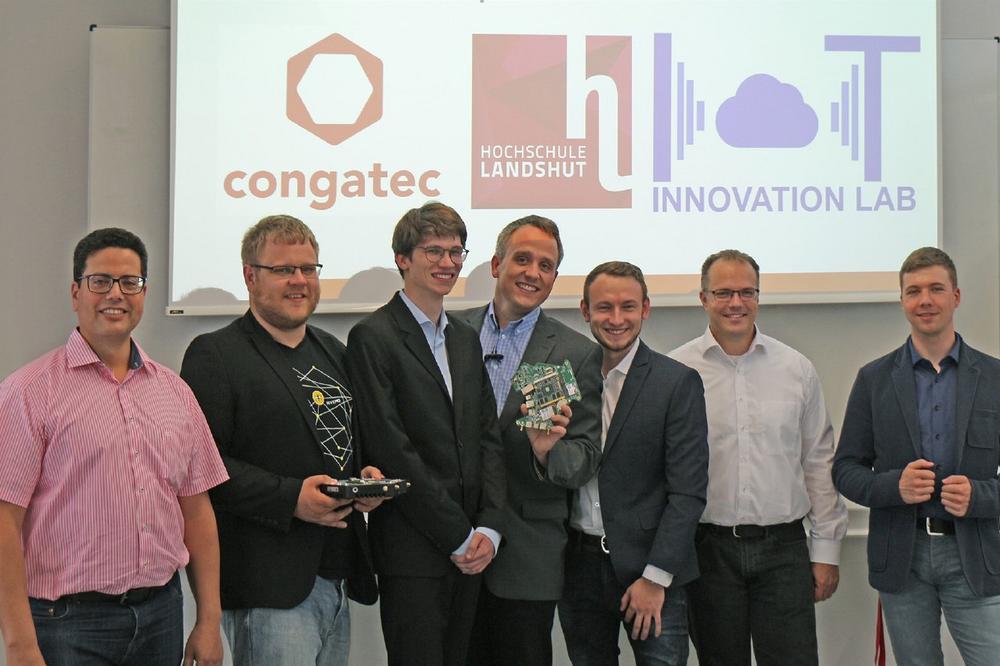Prof. Dr. Abdelmajid Khelil emphasizes the importance of cooperating with industry partners such as congatec: “Students need practical industry challenges to enable them to develop digitization prototypes for real-world applications instead of working inside an academic ivory tower. Modular systems such as congatec’s embedded computer technology and SGET’s UIC standard, which defines a kind of universal modular IoT connector on the software side, are also excellent examples of scientifically recognized development methods. As a result, this cooperation brings theory and practice together in perfect harmony.”
The UIC project, which saw several students working in groups to develop a solution for exchanging data between a computer and a cloud using agile software and system development methods, was mentored by Carsten Rebmann, R&D Director at congatec. Together with lab coach Tobias Christian Piller, he coordinated the project work with the HAW Landshut IoT Innovation Lab, defined the requirements for the software component prototype and monitored project milestone compliance.
Rebmann is enthusiastic about the cooperation with the IoT Innovation Lab and students’ commitment: “I greatly enjoyed coordinating the project with Professor Khelil and the very dedicated coach of the Innovation Lab, Tobias Christian Piller, as well as supervising the group work. Next to developing a concrete component for SGET’s UIC standard, the goal was to explore the journey to get there by trying out solution ideas and creating proof-of-concepts with agile development methods such as Scrum. Thanks to the great commitment from the university and students, this has worked out extremely well and we are looking forward to implementing further projects.”
The results of the IoT project, which counts as a specialization module and during which the “UIC Communication Engine for Amazon Web Services (AWS)” was developed, will be incorporated into the SGET standards and made publicly available under MIT license on the online software development platform GitHub. The MIT license makes it possible to distribute reviews and larger projects without releasing the source code. The results of the students’ open-source IoT project are accessible to the entire community and described in detail at https://github.com/sgetuic/aws_ca.
The spokesman for the student development team, Sebastian Niksch, confirms that despite the great challenges, the project was highly enjoyable: “Actively developing components for digital transformation and knowing that they will be included in standards and probably used worldwide gives us a sense of pride. At the same time, we have gained deeper insight in concrete IoT challenges faced by industry, and learned through practical experience how to approach them methodically. Also, we now understand the challenge of connecting the IoT with hundreds of clouds and even more field devices much better. Uniform standards like the SGET seem to make great sense under those circumstances.”
About HAW Landshut IoT Innovation Lab
The student IoT Innovation Lab at the University of Applied Sciences (HAW) Landshut, Germany, is one of ten laboratories funded by the Bavarian State Ministry for Science and Art within the Center for Digitalization (Zentrum Digitalisierung.Bayern, ZD.B), where students work in groups using innovative agile software and system development methods to design digitalization prototypes. The ideas for the projects originate from different sources (for example, companies, participating students, ZD.B topic platforms).
HAW Landshut has created the IoT Innovation Lab to prepare its students for the development and application of IoT technologies. The IoT Innovation Lab under the direction of Prof. Dr. Abdelmajid Khelil is deliberately exploring a variety of different tasks and fields of application, so that students acquire the skills that are becoming increasingly important for the professional and start-up world of Industry 4.0: to understand what IoT is; to assess the benefits, opportunities and risks of IoT; to gain practical experience in agile software development for IoT; to try out solution ideas and develop agile proof-of-concepts; to independently develop, experimentally test and apply safety concepts for IoT.
congatec is a leading supplier of industrial computer modules using the standard form factors COM Express, Qseven and SMARC as well as single board computers and customizing services. congatec’s products can be used in a variety of industries and applications, such as industrial automation, medical, entertainment, transportation, telecommunication, test & measurement and point-of-sale. Core knowledge and technical know-how includes unique extended BIOS features as well as comprehensive driver and board support packages. Following the design-in phase, customers are given support via extensive product lifecycle management. The company’s products are manufactured by specialist service providers in accordance with modern quality standards. Headquartered in Deggendorf, Germany, congatec currently has entities in USA, Taiwan, China, Japan and Australia as well as United Kingdom, France, and the Czech Republic. More information is available on our website at www.congatec.com or via Facebook, Twitter and YouTube.
congatec GmbH
Auwiesenstrasse 5
94469 Deggendorf
Telefon: +49 (991) 2700-0
Telefax: +49 (991) 2700-111
http://www.congatec.com
Agentur SAMS Network
Telefon: +49 (2405) 4526720
E-Mail: info@sams.network.com
Director Marketing
Telefon: +49 (991) 2700-146
E-Mail: christian.eder@congatec.com
![]()
